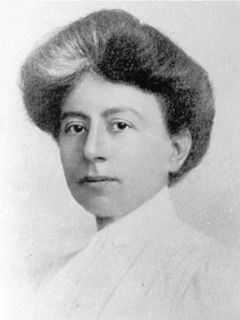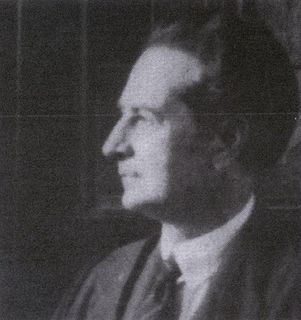Related Research Articles
Psychology is the science of mind and behavior. Psychology includes the study of conscious and unconscious phenomena, as well as feeling and thought. It is an academic discipline of immense scope. Psychologists seek an understanding of the emergent properties of brains, and all the variety of phenomena linked to those emergent properties, joining this way the broader neuro-scientific group of researchers. As a social science, it aims to understand individuals and groups by establishing general principles and researching specific cases.

The American Psychological Association (APA) is the largest scientific and professional organization of psychologists in the United States, with over 122,000 members, including scientists, educators, clinicians, consultants, and students. It has 54 divisions—interest groups for different subspecialties of psychology or topical areas. The APA has an annual budget of around $115m.
Comparative psychology refers to the scientific study of the behavior and mental processes of non-human animals, especially as these relate to the phylogenetic history, adaptive significance, and development of behavior. Research in this area addresses many different issues, uses many different methods and explores the behavior of many different species from insects to primates.
Louis Leon Thurstone was a U.S. pioneer in the fields of psychometrics and psychophysics. He conceived the approach to measurement known as the law of comparative judgment, and is well known for his contributions to factor analysis. A Review of General Psychology survey, published in 2002, ranked Thurstone as the 88th most cited psychologist of the 20th century, tied with John Garcia, James J. Gibson, David Rumelhart, Margaret Floy Washburn, and Robert S. Woodworth.
Cross-cultural studies, sometimes called holocultural studies or comparative studies, is a specialization in anthropology and sister sciences that uses field data from many societies to examine the scope of human behavior and test hypotheses about human behavior and culture.

Margaret Floy Washburn, leading American psychologist in the early 20th century, was best known for her experimental work in animal behavior and motor theory development. She was the first woman to be granted a PhD in psychology (1894), and the second woman, after Mary Whiton Calkins, to serve as an APA President (1921). A Review of General Psychology survey, published in 2002, ranked Washburn as the 88th most cited psychologist of the 20th century, tied with John Garcia, James J. Gibson, David Rumelhart, Louis Leon Thurstone, and Robert S. Woodworth.

The American Sociological Association (ASA) is a non-profit organization dedicated to advancing the discipline and profession of sociology. Founded in December 1905 as the American Sociological Society at Johns Hopkins University by a group of fifty people, the first president of the association would be Lester Frank Ward. Today, most of its members work in academia, while around 20 percent of them work in government, business, or non-profit organizations.

Alfred Reginald Radcliffe-Brown, FBA was an English social anthropologist who developed the theory of structural functionalism and coadaptation.

The Australian Psychological Society (APS) is one of the professional associations for psychologists in Australia. The APS claims to have more than 22,000 members, making it the largest professional body representing psychologists in Australia. The Society's Code of Ethics was adopted in 2007 and became the Code of Ethics for the profession in Australia in 2010 when it was taken up by the newly-formed Psychology Board of Australia. The APS also provides members with recommendations of appropriate fees to charge for their professional services.

The Psychonomic Society is one of the primary societies for general scientific experimental psychology in the United States. It is open to international researchers, and almost 40% of members are based outside of North America. Although open to all areas of experimental and cognitive psychology, its members typically study areas such as learning, memory, attention, motivation, perception, categorization, decision making, and psycholinguistics. Its name is taken from the word psychonomics, meaning "the science of the laws of the mind".
The Journal of Collective Negotiations was a peer-reviewed academic journal which published articles regarding collective bargaining. The target audience for the journal was academics, students, employers, workers, and collective bargaining negotiators. It was published quarterly until 2008 by Baywood Publishing. The journal was cited by the Oxford Handbook of Work and Organization as a critical journal in collective bargaining theory and issues. A common textbook in Industrial and organizational psychology has cited the journal as one of two key publications in that very narrow field. It also has been quoted by the National Labor Relations Board.
Sara J. Shettleworth is an American-born, Canadian experimental psychologist and zoologist. Her research focuses on animal cognition. She is professor emerita of psychology and ecology and evolutionary biology at the University of Toronto.
The Society for Occupational Health Psychology (SOHP) is the first organization in the United States to be devoted to occupational health psychology. It is dedicated to the application of scientific knowledge in order to improve worker health and well-being.
The International Society of Political Psychology (ISPP) is an interdisciplinary not-for-profit organization, representing all fields of enquiry involved with the exploration of relationships between both psychological and political processes and phenomena. Members include psychologists, political scientists, psychiatrists, historians, sociologists, economists, anthropologists, as well as journalists, government officials and others. The Society is also international, with members from all regions of the world: the Americas, Europe, Asia, the Middle East, and Africa. The Central Office is located in North Carolina, USA. The Society is honored by many exceptional scholars and distinguished individuals who are committed members. Throughout its history, the ISPP has offered encouragement to those who actively engaged in a wide spectrum of disciplinary approaches to political psychology. ISPP seeks to bring together all who share their interest from all regions of the world, and welcomes new members. Members receive the Society's journal, Political Psychology and also access to the annual Advances in Political Psychology; ISPPNews, the Society's newsletter; reduced registration fees at ISPP's Annual Scientific Meeting; occasional discounts on non-ISPP publications; and voting privileges. ISPP has the following stated aims:
The Comparative Cognition Society (CCS) is one of the primary scientific societies for the study of animal cognition and comparative psychology. The CCS is a non-profit, international society dedicated to gaining a greater understanding of the nature and evolution of cognition in human and non-human animals.

George Paxinos AO DSc FASSA FAA FRSN FAHMS is a Greek Australian neuroscientist, born in Ithaca, Greece. He completed his BA in psychology at the University of California at Berkeley and his PhD at McGill University in Montreal, Canada. After a postdoctoral year at Yale University, he moved to the School of Psychology of the University of New South Wales in Sydney, Australia. He is currently an NHMRC Senior Principal Research Fellow at Neuroscience Research Australia and Scientia Professor of Medical Sciences at the University of New South Wales.
Karen Hollis is an American professor of psychology and education at Mount Holyoke College in South Hadley Massachusetts. Hollis's research focusses on an evolutionary approach to learning and cognition in non human animals. She served as the head of the American Psychological Association's sixth division from 2006-2007 and the third division (experimental psychology] from 2010-2011. Hollis was the first woman to head the third division. She has served on the editorial boards of many journals, including Animal Behaviour, Animal Learning and Behavior and the Journal of Comparative Psychology.
Myron Kent Jennings is an American political scientist best known for his path-breaking work on the patterns and development of political preferences and behaviors among young Americans. He is widely held in libraries worldwide and is recognized as one of the "founding fathers" of political socialization research and theory. He is Distinguished Professor of Political Science at the University of California, Santa Barbara and Professor Emeritus of Political Science at the University of Michigan. He was elected to the American Academy of Arts and Sciences in 1982, and served as the president of the International Society of Political Psychology in 1989–1990 and as the president of the American Political Science Association in 1997–1998.
Ethel Tobach was an American psychologist known for her work in comparative and peace psychology.
References
- ↑ Innis, Nancy. "The International Society for Comparative Psychology: The First 15 Years". CiteSeerX 10.1.1.560.9940 .Cite journal requires
|journal=(help)